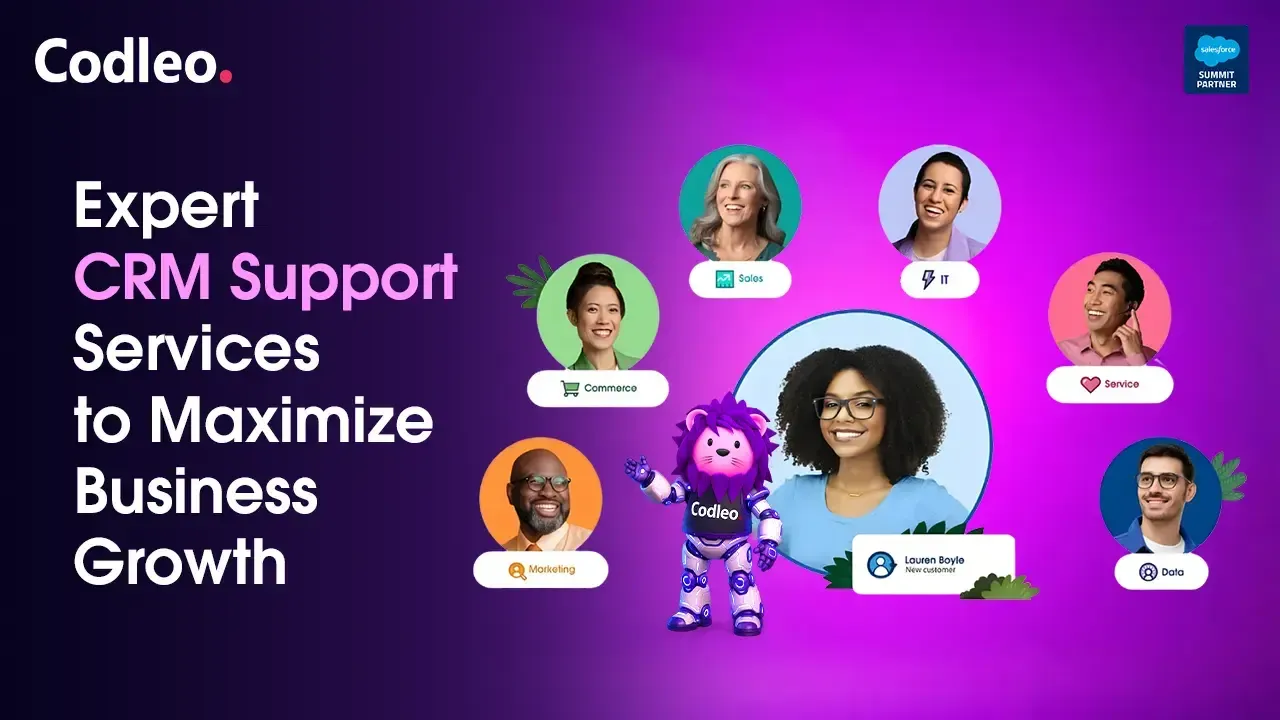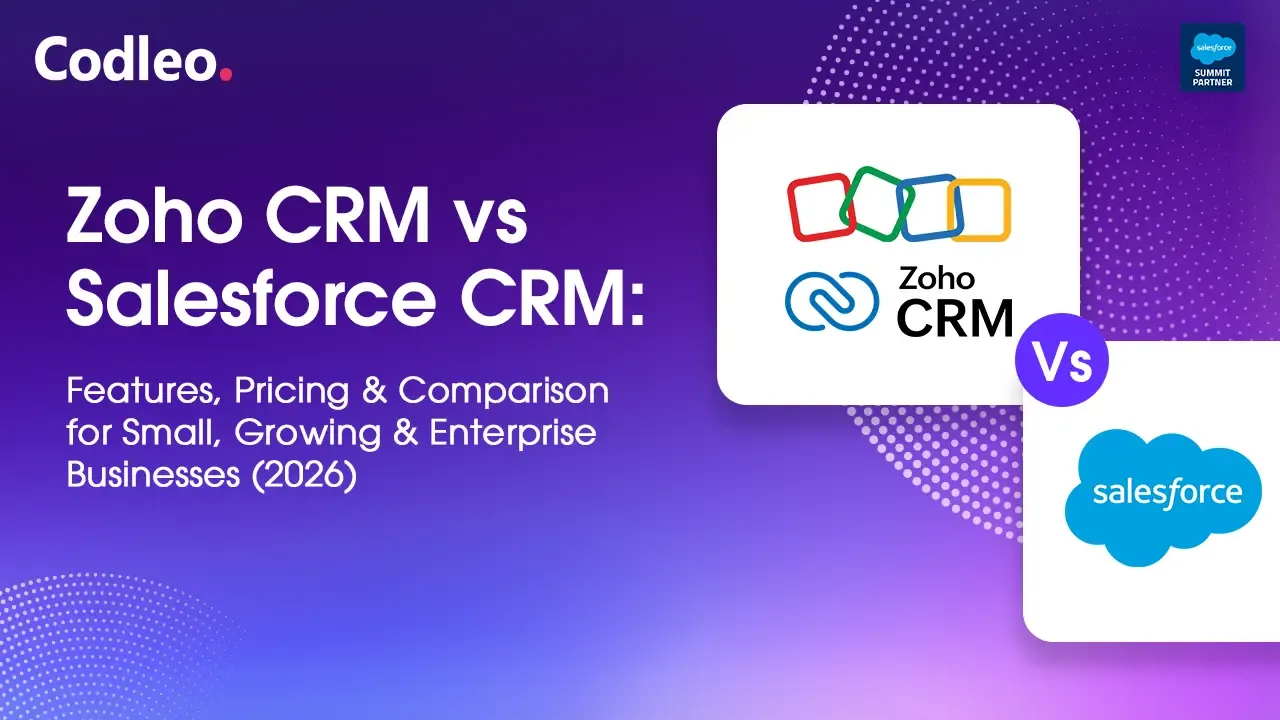Publish date:
Salesforce CRM is very popular because it helps business owners. It is a cloud-based platform for managing customer relationships. It offers a range of products and services that automate numerous manual tasks.
Salesforce has been ranked the #1 CRM provider for the 11th consecutive year!
Regardless of the size of your business, Salesforce can help enhance your workflow and boost productivity. It's even better when you work with a reliable Salesforce development company.
This blog will explain everything you need to know about Salesforce. Let’s get started.
What is Custom Salesforce Development?
Custom Salesforce development tailors the Salesforce platform to fit a business's needs. These services help companies enhance their customer relationship management (CRM) processes.
It utilizes cloud technology to enable businesses to interact more effectively with customers, partners, and clients. Companies can easily track and analyze customer activities, allowing them to focus on their primary tasks. You can also add or remove features as your business needs change.
What Are the Benefits of Custom Salesforce Development Services for Your Business?
Custom Salesforce development services offer a strong, cloud-based CRM platform. It has many benefits, including:
Seamless Integration
One significant benefit of Salesforce development is that it seamlessly integrates with other software, such as marketing tools, ERP systems, or communication platforms. It facilitates the sharing of data between different systems, reducing the need for manual data entry and minimizing the likelihood of errors.
Scalable Solutions
It's essential to have solutions that help your business grow. It ensures your business remains sustainable and competitive. With custom Salesforce development, you can quickly add new or advanced features as your business needs change.
Improved User Experience
Automating specific tasks allows the team to focus on more critical activities. It helps them create more effective strategies and enhances the user experience while increasing productivity.
Actionable Insights
Utilizing custom Salesforce development enables businesses to gain valuable insights and tailor their Salesforce setup to meet their specific needs. This service allows for easy capture, organization, and analysis of data.
Cost-Effective
Custom Salesforce development helps your business by making processes easier and automating tasks. It removes the need for third-party tools. This solution can also grow with your company as its needs change.
What Are the Key Components of Custom Salesforce Development?
Custom Salesforce development services offer a robust framework that enables businesses across various industries to create unique and innovative solutions.
Here is a list of the key components that have a significant impact:
1. Apex
Apex is a programming language that helps developers manage transactions and control application flow on the Salesforce server. With this language, a Salesforce developer can automate business processes and create scalable applications on the Salesforce platform.
2. Visualforce
Visualforce is a special markup language used to create custom interfaces in Salesforce. It works on the Lightning platform, enabling developers to build dynamic pages that seamlessly integrate with Salesforce data. Visualforce also includes "Standard Controllers" that help perform basic database tasks.
3. Lightning Components
Lightning components are the fundamental building blocks used to create modern user interfaces in Lightning Experience, Salesforce apps, and Experience Builder sites. They utilize Lightning Design System markup and classes to deliver excellent performance and improved accessibility while maintaining a compact size.
4. Salesforce Object Query Language
Salesforce Object Query Language (SOQL) helps you search for specific information within your company’s Salesforce data. It is handy for managing data and generating reports, allowing you to find particular records based on various criteria. With SOQL, you can create simple but effective query strings in many different environments.
5. Salesforce APIs
API stands for Application Programming Interface in Salesforce. It is a set of tools and guidelines that helps other applications connect and work with Salesforce. A certified Salesforce developer can use this tool to easily access and change Salesforce data, automate tasks, and link Salesforce with other platforms or services.
Top 5 Phases of Custom Salesforce Development
To develop a Salesforce app, follow a clear and organized process to ensure it meets your business needs. When selecting a Salesforce custom app development company, ensure their team employs the appropriate methods.
Here’s a breakdown of the key phases in the Salesforce Development Lifecycle:
Phase 01: Requirement Gathering and Analysis
The process of developing an app on Salesforce starts by gathering all the requirements and analyzing them in detail. This step helps to understand what the business expects, its processes, and its goals.
By keeping business owners and users informed, the development team can easily identify essential functions, challenges, and opportunities. It enables them to tailor solutions to the company's specific goals, resulting in successful Salesforce implementations.
Phase 02: Design and Planning
The next step is designing and planning. Designers create blueprints based on the information they collected. The project blueprint includes data models, workflows, and UI layouts.
Designers choose the right tools and technologies at this stage, such as Apex for the backend and Lightning Components for developing the user interface. This step starts the development process and ensures that business goals and needs are matched.
Phase 03: Development and Customization
After creating the blueprints, development begins. At this stage, developers start coding to build and set up the Salesforce solution according to the requirements.
This phase involves creating custom applications, automating essential tasks, and connecting third-party systems using APIs. Developers build solutions on Salesforce to improve efficiency, streamline workflows, enhance user experience, and more.
Phase 04: Testing and Deployment
After development is complete, we need to test everything thoroughly to ensure it works as expected. We perform unit testing and user acceptance testing (UAT) to verify that workflows are automated, data is accurate, and systems function correctly in conjunction with each other.
After testing, we start the deployment phase. We manage this process carefully to ensure a smooth transition and to minimize any impact on business operations. We utilize tools like Change Sets or DevOps to provide a reliable and structured deployment.
Phase 05: Training and Support
It is the final stage, where users receive hands-on training to ensure their systems function correctly. We provide detailed user manuals to help users understand the system's functions and features.
Offering post-development support and maintenance services is crucial because it enables the quick resolution of issues and implementation of necessary changes. It keeps the solutions aligned with your evolving business needs and ensures they continue to deliver the expected results.
How to Choose the Right Salesforce Development Company?
Choosing the right Salesforce development company is crucial because it can significantly impact your business’s success or failure. It's essential to find a company that understands your needs and can meet your expectations.
Here is a list of key points that you should keep in mind when hiring the right team of experts for your business goals:
Assess Their Expertise
When selecting a Salesforce development company, the most crucial factor to consider is the team's expertise. Verify that the company has developers with the necessary certifications and relevant experience. Additionally, ensure they can work with various Salesforce products, including Sales Cloud, Service Cloud, and Marketing Cloud.
Look for Exceptional Skills
Look for a talented team that can meet your specific business needs. Consider using a company that offers Salesforce app development services and has provided custom Salesforce solutions tailored to your needs. Their expertise will help you gain valuable insights and ensure long-term success.
Evaluate Client Testimonials
Reading client testimonials can help you trust a company and choose the right one for your business. Take the time to look at honest client feedback (or reviews) as they show the quality of their Salesforce solutions. It’s even better if they have worked with businesses in your industry before, as this means they can better understand and meet your goals.
Ensure Post-Development Support
A trustworthy company will provide you with support services after you develop your Salesforce system. It indicates that you have found the right partner. A reliable Salesforce partner will regularly review your Salesforce setup to identify and resolve any issues. It helps keep your system up to date and ready for changing business needs.
Consider Budget and Scalability
Ultimately, it’s essential to consider the company’s budget and scalability. You want to obtain high-quality solutions that align with your financial needs. Ensure the company’s services are grounded in strong values and consistently maintain quality, regardless of the budget. Also, check that they can offer solutions that can grow with your needs.
Why Choose Codleo as Your Trusted Salesforce Development Company?
Choose Codleo as your Salesforce development partner. Many well-known brands trust us. We have completed over 2,000 projects, and our clients are delighted.
We have a team of certified Salesforce developers with extensive experience in the field. We have achieved outstanding results across various industries. Our services include Salesforce implementation, customization, integration, development, and post-development support.
We are a reliable Salesforce development company with certifications from ISO and Great Place to Work. We also have a SOC 2 Type II compliance certificate. We have a strong history of completing projects successfully and cost-effectively, while maintaining high quality.
Our team not only completes projects but also provides ongoing support and maintenance to ensure your Salesforce system runs smoothly.















